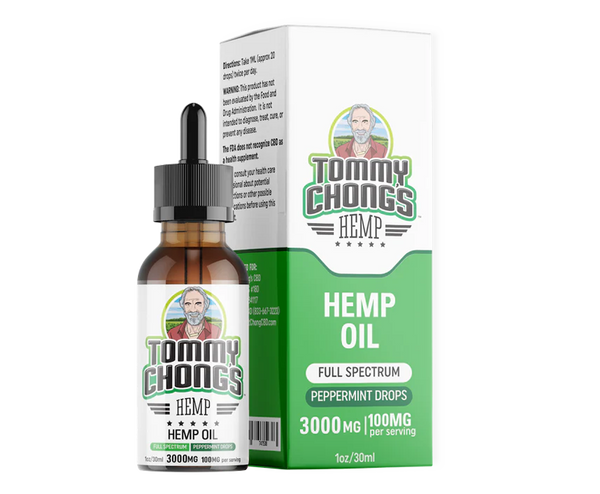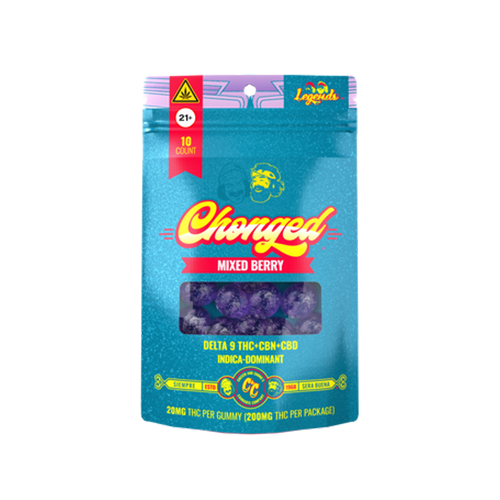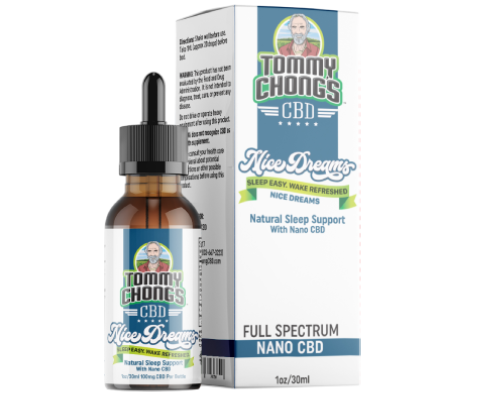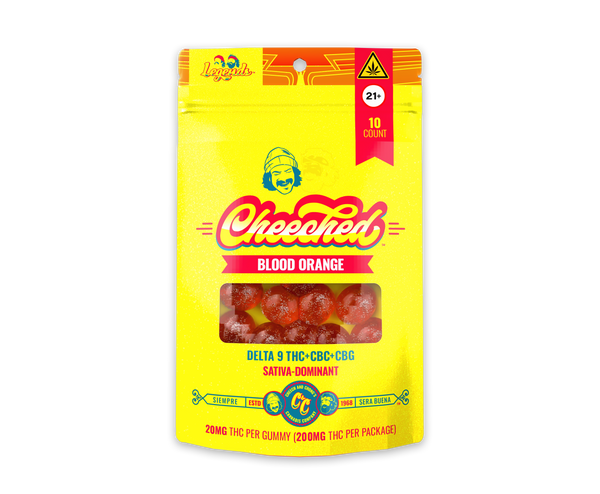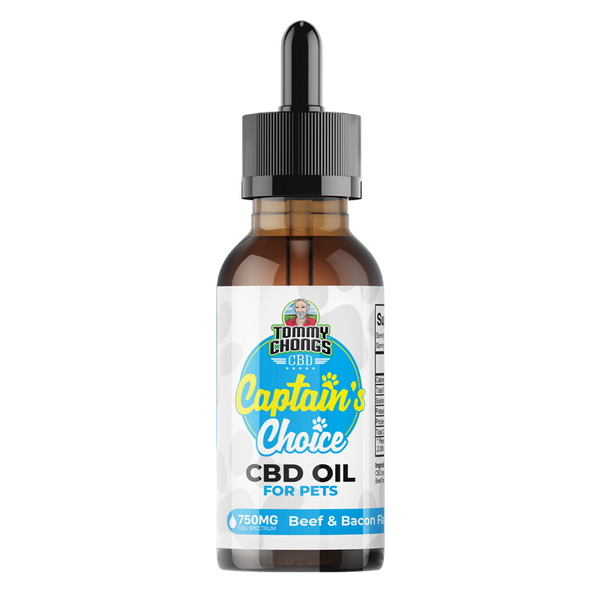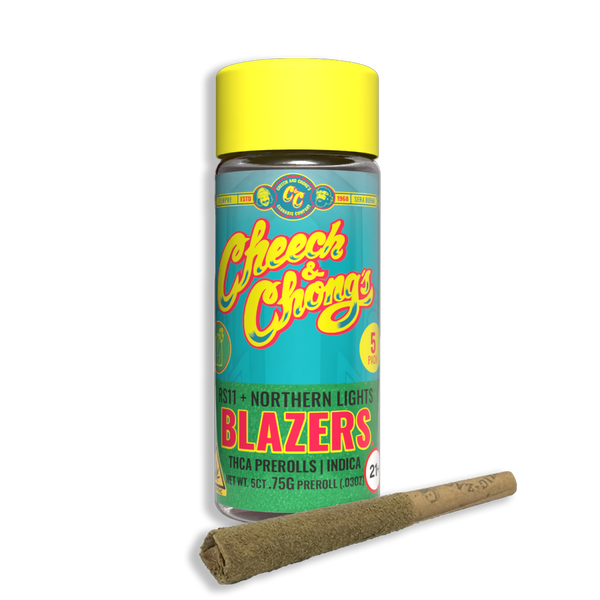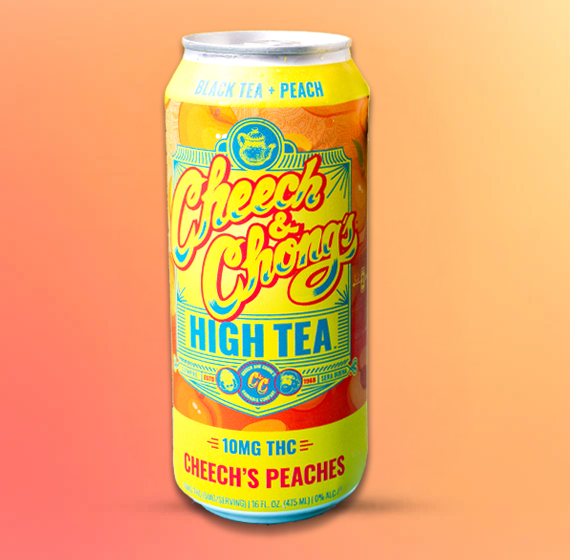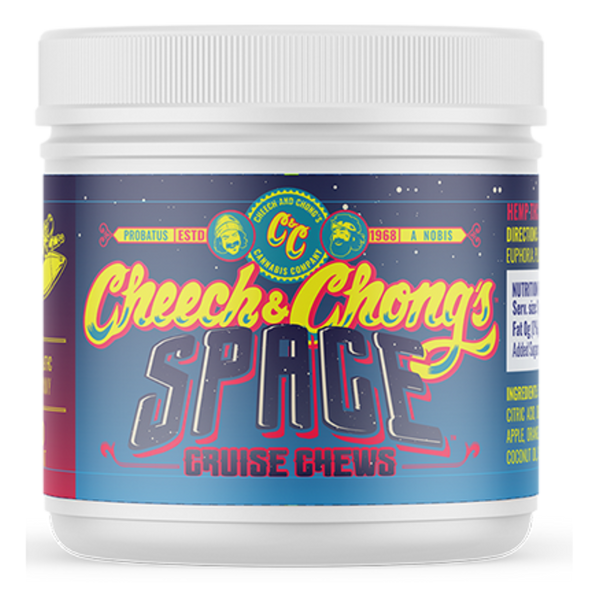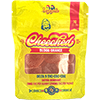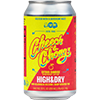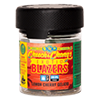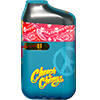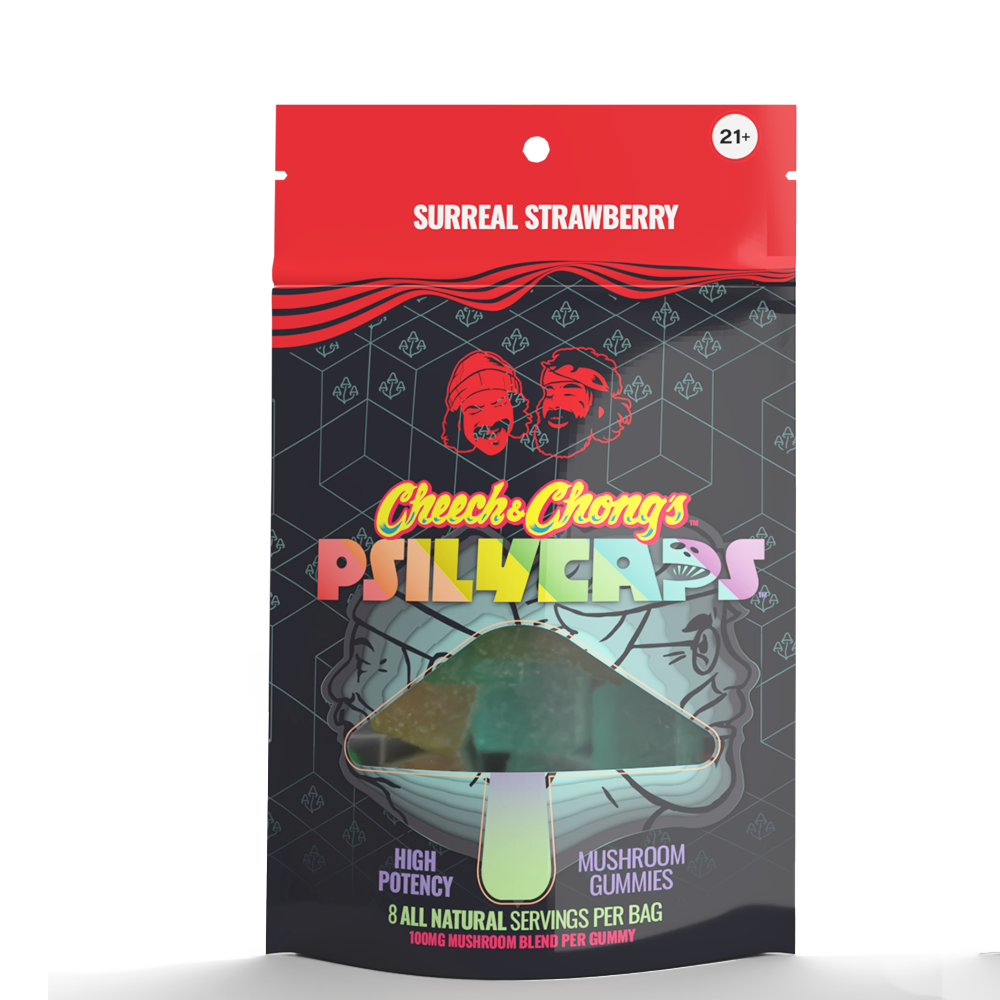THCp vs. Delta-9: How They Compare in Potency, Effects, and More
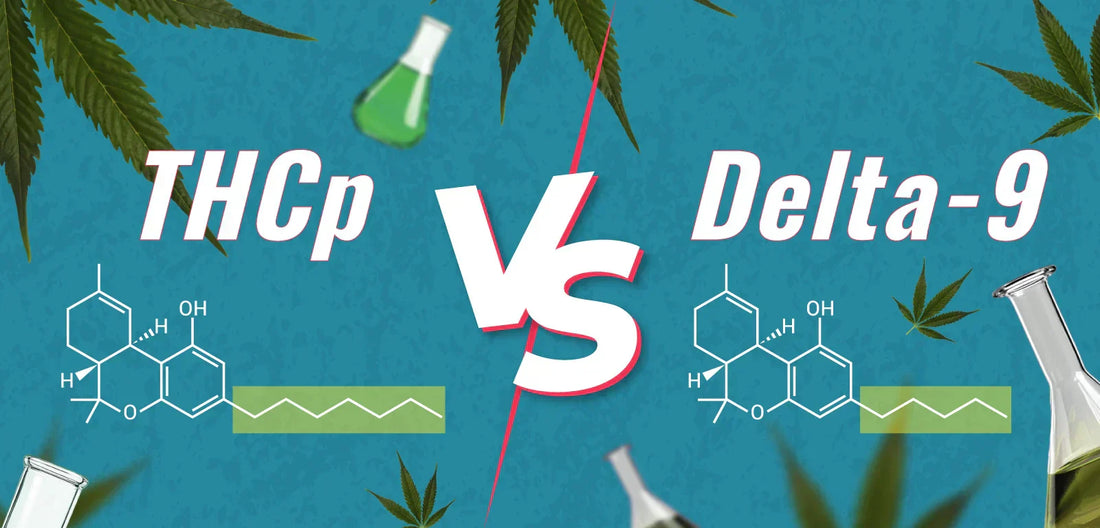
Think of Delta-9 THC as a strong cup of coffee — reliable, energizing, and just the right amount of buzz to get you going. Now imagine THCp as a quadruple shot of espresso. They share the same basic foundation, but THCp packs a way bigger punch.
Both THCp and Delta-9 THC are cannabinoids found in the cannabis plant, and both interact with your body’s endocannabinoid system, specifically those CB1 receptors in your brain. But THCp, thanks to a couple of extra carbon atoms in its chemical structure, binds to those receptors way more tightly. We’re talking potentially 30+ times the potency of regular Delta-9 THC.
So why is everyone suddenly googling this mystery molecule? Because it’s one of the strongest naturally occurring phytocannabinoids ever discovered, and thanks to the 2018 Farm Bill, it’s federally legal when derived from hemp plants.
However, it’s still super fresh on the scene. Scientists only stumbled on it in 2019. So even though it can send you to the moon, the whole picture on the good vibes and the not-so-groovy stuff isn’t totally clear yet.
If you’re exploring the evolving world of cannabinoids and want something federally legal with effects that range from mellow to mind-blown, check out Cheech and Chong’s collection of hemp-derived cannabis products, thoughtfully formulated for whatever vibe you’re chasing.

THCp vs. Delta-9: Your High-Level Overview (See What We Did There?)
THCp and Delta-9 THC might look similar on a molecular level, but the differences in how they act and how hard they hit are pretty major. A couple of tweaks in THCp’s chemical structure make it significantly more potent than Delta-9, even though both cannabinoids interact with the same receptors in your brain.
If you’re trying to figure out which one fits your needs (or tolerance), check out this side-by-side breakdown of the key differences so you can pick your path with a little more clarity and a lot less guesswork.
| Best for | Experienced users, people seeking a heavier or longer-lasting high | Beginners, first-timers, or everyday users |
| Effects | Introspective, sedating, body-heavy; can feel psychedelic even at low doses | Uplifting, euphoric, relaxing; varies by strain and dose |
| Potency | Extremely potent: binds up to 33x more tightly to CB1 receptors | Strong and effective, but less intense than THCp per milligram |
| Duration | Long-lasting: 6 to 8 hours when smoked/vaped Up to 24 hours with edibles |
Moderate: 1 to 3 hours when smoked/vaped Up to 12 hours with edibles |
| Control & Dosing | Easy to overdo; very small amounts can go a long way; harder to dose consistently | Easier to measure and control; well-established dosing standards |
| Likelihood of Side Effects | Higher chance of side effects like dizziness, paranoia, or feeling “too high” | Lower chance of side effects than THCp |
| Presence in Cannabis | Exists only in trace amounts in cannabis | Naturally abundant in cannabis |
| How It’s Made | Semi-synthetic: made from hemp-derived CBD through isomerization in a lab | Naturally extracted from cannabis; no chemical conversion needed |
| Legality | Federally legal if hemp-derived and compliant, but sometimes restricted at the state level due to its semi-synthetic status | Federally legal if it doesn’t exceed 0.3% Delta-9 THC by dry weight; state restrictions, if any, depend on individual state law |
While Delta-9 THC remains the first choice for many cannabis consumers, THCp is carving out a reputation as the go-to for experienced users seeking something stronger. With its amplified potency and longer-lasting effects, THCp isn’t trying to replace Delta-9, but it’s definitely staking its claim as a next-level option for those who want to explore deeper, stronger, or simply different highs.
Comparing THCp and Delta-9 THC: Same Family, Different Ride
Now that you’ve seen the quick-hit differences, let’s break things down in a bit more detail. THCp and Delta-9 share many similarities, but they take you on very different rides. They interact with the same receptors in your body, but not in the same way. They’re made using different methods. And in terms of effects, one’s a familiar cruise, and the other is more of a launch sequence.

Below, we’ll compare how each cannabinoid functions across key categories: how they work in the body, how they’re made, their effects, potency, and how long they last.
How They Work in the Body
Let’s start with the science behind the sesh: how each cannabinoid interacts with your body’s endocannabinoid system. These internal receptors are the control center for your emotional and cognitive processes. The difference in how THCp and Delta-9 bind to those cannabinoid receptors (specifically the CB1 receptors in your brain) is what gives each one its signature vibe.
THCp: Receptor Hugger Extraordinaire
THCp (short for tetrahydrocannabiphorol) interacts with your endocannabinoid system much like Delta-9, but THCp binds WAY more strongly to CB1 receptors — the part of your brain that manages mood, perception, appetite, and more. This ultra-tight connection comes from a small difference in its molecular structure. THCp has a seven-carbon alkyl side chain, compared to Delta-9’s five. That longer chain gives it a firmer grip on your brain’s cannabinoid receptors, resulting in huge psychoactive effects, even in tiny amounts.
Delta-9 THC: The Classic Connector
Delta-9 THC (aka tetrahydrocannabinol) also binds to CB1 receptors, but its five-carbon side chain binds with a more moderate strength. That’s not a bad thing — it’s what gives you the familiar, feel-good effects most people associate with THC: euphoria, giggles, and relaxation, without the significant intensity that THCp often brings. It’s the go-to cannabinoid for a reason. It’s smooth, reliable, and easy to manage.
How They’re Made
Both THCp and Delta-9 are technically phytocannabinoids (meaning they naturally occur in the cannabis plant). But while they share botanical roots, the process of getting each one into a product on the shelf looks pretty different. Delta-9 comes straight from the source, while THCp needs a little lab magic to be usable in products.
THCp: A Lab-Born Powerhouse
While THCp does occur naturally, it shows up in such tiny trace amounts that extracting it directly from cannabis isn’t very practical. Instead, most THCp on the market is made from hemp-derived cannabidiol through a process called isomerization, a chemical technique that rearranges CBD’s molecular structure into that of THCp. No new elements are added; it’s the same atoms, just reshuffled into a more potent form.
Because it begins with a natural compound but is chemically modified, THCp is classified as a semi-synthetic cannabinoid. Once converted, it’s refined, tested, and infused into legal hemp-derived products like gummies, vapes, and tinctures.
Delta-9 THC: Straight from the Plant
Delta-9 THC, on the other hand, is naturally abundant in traditional marijuana strains and doesn’t need molecular tinkering to do its thing. It’s found in high concentrations in the trichomes on the cannabis flower. So when you smoke or vape raw cannabis flower, you’re inhaling Delta-9 THC in its naturally occurring form.
For most packaged cannabis products, Delta-9 is first extracted via CO2 or ethanol and then decarboxylated (a heat-activation process) to turn it into its active state before being added to the final product. It’s simple, natural, and well-tested.
Potency
This is where things really get interesting. Potency isn’t just about how “strong” something feels, it’s about how efficiently a compound interacts with your body. And when it comes to THCp and Delta-9 THC, those power levels aren’t even in the same weight class.
THCp: The Heavyweight Champ
When it comes to raw receptor binding, THCp is the undisputed heavyweight winner. Studies suggest it binds up to 33 times more strongly than Delta-9 at CB1 receptors. That doesn’t mean you’ll feel 33 times higher, just that you need way less of it to get similar or stronger effects.
But with great potency comes . . . the chance to overdo it. THCp’s intensity means even a small dose can hit hard, and if you’re not easing in slowly, you might find yourself a little more spaced out than planned.
Delta-9 THC: Strong but Familiar
Potent in its own right, Delta-9 THC produces a familiar and well-balanced high that most people can handle in moderate doses. While it doesn’t pack the same punch-per-milligram as THCp, it’s far easier to control and dose accurately, which makes it ideal for both beginners and anyone who prefers a more consistent experience.
Effects
Both THCp and Delta-9 THC produce psychoactive effects, but they don’t hit the same. Whether you’re after a laid-back lift or something a little more intense, understanding their effects can help you steer the experience (instead of the other way around).
THCp: The Deep Space Explorer
THCp is known for producing stronger, deeper body highs. The effects of THCp can feel heavy, dreamy, and incredibly immersive, even at low doses. People also report feeling super chill, sedated, or more introspective. It’s like your brain hit the “expand consciousness” button.
Related Products
Some early anecdotal evidence suggests THCp might offer therapeutic benefits like pain relief or sleep support, but more research is needed to confirm that. However, reports of dry mouth, paranoia, and dizziness aren’t uncommon if you overshoot the sweet spot, which is easier to do with THCp’s extreme potency.
Delta-9: The Feel-Good Classic
Delta-9 delivers that familiar cannabis high that most people know and love. It can make you euphoric, sociable, creative, or just ready to melt into the couch with a bag of snacks. The effects vary depending on the strain (like indica or sativa), terpenes, and your tolerance, but overall it’s a balanced experience that gives you more control over how lifted you get.
And when it comes to side effects, Delta-9 tends to play nicer. While everyone reacts differently, most users find it easier to predict and manage, which makes it a better starting point for beginners or anyone wanting a smoother ride.
Duration
How long your high lasts can make or break the experience, especially if you’ve got plans later (or zero plans and want to keep it that way). THCp and Delta-9 differ not just in how hard they hit but also in how long they linger. So whether you’re timing your session for a chill weekend vibe or just trying to avoid getting caught in a lengthy stoner spiral, it helps to know what you’re in for.
THCp: The Long Hauler
THCp isn’t just strong — it’s a slow burn with serious staying power because of how tightly it binds to CB1 receptors. Users report highs lasting 6 to 8 hours or more when smoked or dabbed and up to 12 to 24 hours when taken as edibles. That kind of staying power can be a big plus if you’re using cannabinoids to manage pain or sleep issues, but it’s not ideal if you’ve got anything time-sensitive on your schedule.
That said, it’s worth noting that research on THCp’s duration is still very limited, and user experiences can vary widely. The bottom line is: Don’t assume THCp will wear off as quickly as Delta-9.
Delta-9 THC: In, Out, and On with Your Day
Delta-9 THC delivers a much more predictable timeline. When smoked or vaped, the high usually lasts up to 3 hours, while edibles can stretch up to 12 hours, depending on dose and tolerance. The comedown tends to be smoother too, so it’s easier to plan your day (or night) around it.
If you’re looking for something that gets in, does the job, and lets you move on, Delta-9 is the more manageable option. Great for quick hangs, creative bursts, or a well-timed wind-down that won’t hijack your whole schedule.
Control & Dosing
Not all cannabinoids are equally easy to work with, especially when it comes to knowing how much to take. THCp and Delta-9 differ not just in potency, but in how predictable they are once they’re in your system. Here’s what you need to know before you take that first hit (or bite).
THCp: Harder to Measure, Easier to Overshoot
THCp is an extremely potent cannabinoid, which means even small doses can hit much harder than expected. Its strong binding affinity to CB1 receptors makes its effects less forgiving if you overshoot your dose. And because THCp is a new cannabinoid, very little formal research has been done on proper dosing. If you’re experimenting with THCp, start with a fraction of what you’d normally take with Delta-9 and be sure to give it ample time before redosing.
Delta-9 THC: Consistent Dosing, Predictable Effects
Delta-9 is the most well-studied and widely consumed cannabinoid, which means dosing guidelines are well established. Whether you’re microdosing a tincture or popping a 10 mg gummy, it’s easy to find your personal sweet spot. Its effects are more predictable and easier to control, making Delta-9 a better fit for first-timers or anyone who likes a bit more precision in their high.
Legality
When it comes to cannabis compounds, legality is rarely black and white. It's more like a patchwork quilt stitched together by state laws, federal laws, and hemp definitions. Both THCp and Delta-9 can be sold legally, but the laws that apply to each differ depending on how the product is produced and where you live.
THCp: Semi-Synthetic and Legally Slippery
Most THCp on the market is made from hemp-derived CBD, which technically makes it federally legal under the 2018 Farm Bill, as long as the finished product contains no more than 0.3% Delta-9 THC by dry weight. But because it’s made by chemically converting a natural cannabinoid, THCp is considered semi-synthetic, which makes things a little trickier.
A growing number of states have started banning or imposing regulations on synthetic and semi-synthetic cannabinoids, regardless of their federal legality. That means THCp often gets caught in the same dragnet as Delta-8 THC, Delta-10 THC, HHC, and THC-O. So while you might be able to order THCp online, that doesn’t necessarily mean it’s legal where you live.
Bottom line: Always check your local laws. And when you buy, make sure it’s from a reputable brand that provides lab testing and compliance documentation.
Delta-9 THC: A Defined Legal Path, with Limits
Delta-9 THC is easier to navigate than THCp, but it’s not without its fine print. When it’s hemp-derived and no more than 0.3% Delta-9 THC by dry weight, it’s federally legal under the 2018 Farm Bill. That’s how legal THC flower, vapes, and edibles are able to exist in states that haven’t fully legalized weed. When it’s derived from marijuana, it’s federally illegal, but that’s where state cannabis laws come into play. Many states have legalized it for medical or recreational use, giving consumers a more straightforward path to access.
Bottom line: Delta-9 THC has a more concrete legal status than THCp, but state laws still matter. Always check your local laws and stick with lab-tested products from trusted brands to stay on the right side of the rules.
THCp or Delta-9? It All Comes Down to What You’re After
Still torn between THCp and Delta-9? No worries, we get it. Choosing the right cannabinoid isn’t just about strength; it’s about finding the experience that fits your vibe. Whether you want a predictable buzz or if you’re ready to test your tolerance, here’s how to pick your cannabinoid based on what you want out of the experience:
-
If you want maximum potency, go with THCp. THCp hits way harder — like, 30x harder — at CB1 receptors. If you’re chasing intensity, THCp is the clear winner. Delta-9 is strong, too, just not in the launch-you-to-the-moon kind of way.
-
If you want control, Delta-9 wins. Delta-9 is predictable, consistent, and well-documented. THCp? Not as much, so small changes can mean big effects.
-
If you want a longer lasting high, THCp delivers. THCp highs can last 6 to 8+ hours when smoked and up to 24 hours with edibles. Delta-9 wears off faster, typically within 1 to 3 hours when smoked or up to 12 with edibles.
-
If you’re new to cannabis, Delta-9 is the move. Delta-9 is the classic for a reason: smoother learning curve, more guidance, less guesswork. THCp is more of a graduate-level experience because of its intensity and unpredictability.
-
If you love to experiment, THCp is your next adventure. If you’re the type who’s always trying new strains and rare cannabinoids, THCp is a wild new frontier for seasoned users who like to push the envelope. Delta-9 is the classic, but you probably already know exactly how it treats you.
- If you care most about legal clarity, Delta-9 is safer. Hemp-derived Delta-9 is federally legal and accepted in more states. THCp’s semi-synthetic status gets flagged more often under local laws.
If you’re curious how THCp stacks up against other new players like THCa, our side-by-side comparison on THCp vs. THCa is worth a read. And if you’re ready to see what the hype is about, Cheech and Chong’s edibles, vapes, and flower offer some of the smoothest (and most trusted) ways to explore the scene.
The Smarter Way to Shop for THCp, Delta-9, and Beyond
Let’s be honest, some cannabis products are thoughtfully crafted, while others are just . . . crafted. And when you’re dealing with newer compounds like THCp, it’s worth taking a closer look at what’s actually in the jar. So whether you’re shopping for a THC classic or the next big cannabinoid, here’s how to separate the good stuff from the sketchy stuff.

-
Always look for third-party lab results. A legit product should come with a Certificate of Analysis (COA) from an independent lab, no exceptions. It should confirm the cannabinoid content and screen for things you don’t want (pesticides, solvents, etc). This is especially non-negotiable for THCp products that are new to the market, because potency and purity can vary widely. At Cheech and Chong, we post full lab reports for all of our products, so you can see exactly what you’re getting.
-
Skip mystery blends and vague labels. If the product says “proprietary blend” or doesn’t clearly list how much of each cannabinoid is inside, that’s a no. For something as potent as THCp, you want precise dosing info, not guessing games. We label every product clearly, breaking down the exact milligrams per serving, so you’re never guessing what’s in your gummies, vapes, or pre-rolls.
-
Go with hemp products that play by the federal rules. If you’re buying online or outside of a dispensary, make sure the product is hemp-derived and contains no more than 0.3% Delta-9 THC by dry weight. That’s what keeps it federally legal. Good brands will be up front about this. Every cannabis product at Cheech and Chong is Farm Bill–compliant and hemp-derived, so you can chill knowing your purchase is federally legal.
- Buy from brands that prioritize transparency. Look for companies that explain where their cannabinoids come from, how their products are made, and why you should trust them. If a brand can’t answer basic questions, they’re probably not the ones you want handling your high. We bring that rare combo of experience and quality control, backed by lab testing, solid sourcing, and a commitment to doing things right.
Will THCp or Delta-9 Make You Fail a Drug Test?
Yep, most likely.
When your body processes THCp or Delta-9, it breaks down into THC-COOH, the same metabolite drug tests are built to catch. And those tests don’t care what kind of THC you took, they just care that it’s there.
Below are the types of drug tests you might encounter, along with their detection windows:
-
Urine tests: These are the most common drug tests, and can detect THC-COOH for 3 to 30 days, depending on how much and how often you consume.
-
Saliva tests: Usually detectable for 24 hours for occasional users and up to 48 hours for chronic users
-
Blood tests: Typically detectable for a few hours and up to 7 days for chronic users
- Hair tests: Can detect THC for up to 90 days, although hair tests are rare
Also, the more frequently you consume THC (whether it’s Delta-9, THCp, or something else) the more likely your body is to build up metabolites that stick around longer. This means that regular use increases the chance that a drug test will detect these metabolites, while occasional use typically results in faster clearance. So if you know a drug test is on the horizon, the safest move is to skip THC products altogether.
Some Like It Classic. Some Like It Cosmic.
Whether you’re drawn to the familiar feel of Delta-9 or the potency of THCp, the real win is knowing what you’re getting and how to make it work for you. Delta-9 is the trusted go-to: easy to navigate and widely loved. THCp on the other hand brings more punch, more duration, and a little more curiosity to the experience.
Each cannabinoid offers something unique, and the best choice is the one that fits your goals, your tolerance, and your vibe. No matter which direction you go, it all comes down to starting slow, buying smart, and listening to your body. That’s how you find your sweet spot and your best high.
And if you’re looking for high-quality hemp-derived products you can actually trust, check out Cheech and Chong's cannabis lineup, where everything is legal, lab-tested and shipped straight to you.


